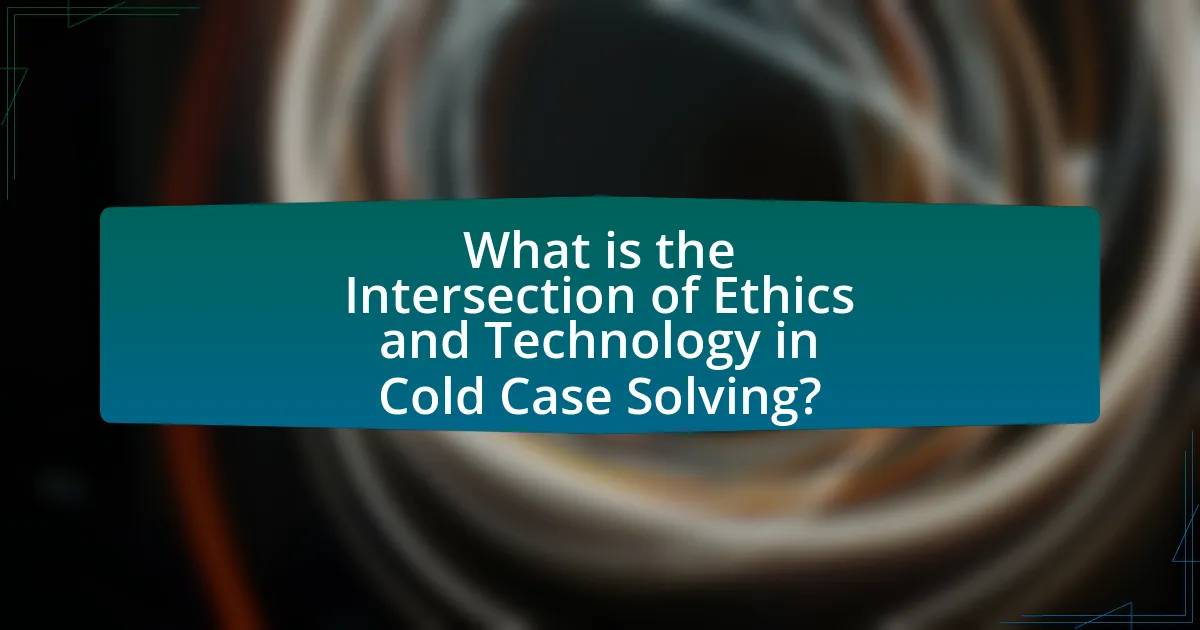The article examines the intersection of ethics and technology in cold case solving, highlighting the role of advanced tools such as DNA analysis, artificial intelligence, and data mining in enhancing investigative processes. It addresses the ethical dilemmas that arise from these technologies, including privacy concerns, consent issues, and the potential for bias, emphasizing the need for ethical frameworks to guide their application. The discussion includes best practices for ensuring responsible use of technology, the importance of stakeholder engagement in establishing ethical standards, and the consequences of neglecting ethical considerations in law enforcement. Overall, the article underscores the critical balance between leveraging technological advancements and upholding individual rights in the pursuit of justice.

What is the Intersection of Ethics and Technology in Cold Case Solving?
The intersection of ethics and technology in cold case solving involves the application of advanced technological tools while adhering to ethical standards in criminal justice. Technology, such as DNA analysis, artificial intelligence, and data mining, enhances investigative capabilities, allowing law enforcement to revisit unsolved cases with new insights. However, ethical concerns arise regarding privacy, consent, and the potential for wrongful accusations, as seen in cases where genetic databases are used without individuals’ knowledge. Balancing these technological advancements with ethical considerations is crucial to ensure justice is served without compromising individual rights.
How do ethics influence the use of technology in solving cold cases?
Ethics significantly influence the use of technology in solving cold cases by establishing guidelines that ensure the responsible application of forensic tools and data. Ethical considerations dictate the balance between the pursuit of justice and the protection of individual rights, particularly regarding privacy and consent. For instance, the use of DNA databases must adhere to strict ethical standards to prevent misuse of genetic information, as highlighted by the National Institute of Justice, which emphasizes the importance of informed consent and data security in forensic applications. Furthermore, ethical frameworks guide law enforcement agencies in the responsible use of artificial intelligence and data analytics, ensuring that these technologies do not perpetuate biases or lead to wrongful accusations. Thus, ethics serve as a foundational element in the integration of technology in cold case investigations, shaping practices that prioritize both efficacy and justice.
What ethical dilemmas arise from using advanced technology in investigations?
The use of advanced technology in investigations raises significant ethical dilemmas, primarily concerning privacy, consent, and the potential for bias. Investigators often utilize tools such as facial recognition software and data mining, which can infringe on individual privacy rights without explicit consent. For instance, a study by the American Civil Liberties Union highlighted that facial recognition technology can misidentify individuals, particularly among marginalized communities, leading to wrongful accusations and reinforcing systemic biases. Additionally, the reliance on algorithms in decision-making processes can perpetuate existing inequalities, as these systems may be trained on biased data. This creates a moral obligation for law enforcement to ensure that technology is used responsibly and equitably, balancing the pursuit of justice with the protection of civil liberties.
How can ethical considerations shape the development of new technologies?
Ethical considerations can significantly shape the development of new technologies by guiding the design, implementation, and application processes to ensure they align with societal values and human rights. For instance, in the context of cold case solving, ethical frameworks can dictate how data is collected, analyzed, and used, ensuring that privacy rights are respected and that the technology does not perpetuate biases. Research by the American Psychological Association highlights that ethical guidelines in technology development can prevent misuse and promote accountability, thereby fostering public trust in technological advancements.
What role does technology play in modern cold case investigations?
Technology plays a crucial role in modern cold case investigations by enhancing the ability to analyze evidence and identify suspects. Advanced forensic techniques, such as DNA analysis, allow investigators to re-examine old evidence with greater accuracy, leading to potential breakthroughs in cases that have remained unsolved for years. For instance, the use of genetic genealogy has successfully solved numerous cold cases by matching DNA from crime scenes to public databases, as demonstrated in the case of the Golden State Killer, where investigators utilized this technology to identify the suspect after decades. Additionally, digital tools like data mining and artificial intelligence assist law enforcement in uncovering patterns and connections that may have been overlooked, thereby increasing the chances of resolving cold cases.
What types of technology are commonly used in cold case solving?
Commonly used technologies in cold case solving include DNA analysis, digital forensics, and geographic information systems (GIS). DNA analysis allows investigators to identify suspects or victims through genetic material, which has been pivotal in resolving cases that have remained unsolved for years. Digital forensics involves recovering and analyzing data from electronic devices, providing crucial evidence that can lead to breakthroughs in investigations. Geographic information systems (GIS) help in mapping crime scenes and analyzing spatial data, which can reveal patterns or connections that were previously overlooked. These technologies have significantly enhanced the ability of law enforcement agencies to revisit and solve cold cases.
How has technology evolved to assist in cold case investigations?
Technology has evolved significantly to assist in cold case investigations through advancements in forensic science, data analysis, and digital tools. Forensic DNA analysis has become more sensitive and efficient, allowing investigators to extract and analyze DNA from older evidence that was previously unusable. Additionally, the use of advanced databases, such as the Combined DNA Index System (CODIS), enables law enforcement to match DNA profiles from cold cases with those of known offenders, increasing the likelihood of solving these cases.
Moreover, digital forensics has improved the ability to analyze electronic evidence, including emails, social media interactions, and mobile phone data, which can provide crucial leads. Machine learning algorithms are now employed to analyze large datasets, identifying patterns and connections that human investigators might overlook. These technological advancements have led to a notable increase in the resolution of cold cases, with statistics indicating that the use of DNA evidence has contributed to solving thousands of previously unsolvable cases in recent years.
Why is the intersection of ethics and technology crucial in cold case solving?
The intersection of ethics and technology is crucial in cold case solving because it ensures that advancements in forensic technology are applied responsibly and justly. Ethical considerations guide the use of technologies such as DNA analysis, artificial intelligence, and data mining, which can significantly enhance investigative processes. For instance, the use of DNA databases must balance the potential for solving cases with privacy rights and the risk of wrongful accusations. Studies have shown that ethical frameworks in technology application can lead to more reliable outcomes, as seen in the successful resolution of cold cases through ethically guided technological interventions, such as the case of the Golden State Killer, where ethical use of genealogy databases led to an arrest.
What are the potential consequences of neglecting ethical standards in technology use?
Neglecting ethical standards in technology use can lead to significant consequences, including privacy violations, misuse of data, and erosion of public trust. For instance, when law enforcement agencies utilize technology without ethical guidelines, they risk infringing on individuals’ rights, as seen in cases where surveillance tools are deployed without proper oversight. A report by the Electronic Frontier Foundation highlights that unregulated use of facial recognition technology can result in wrongful arrests and discrimination, demonstrating the real-world implications of ethical neglect. Furthermore, the lack of ethical standards can foster a culture of impunity, where organizations prioritize technological advancement over accountability, ultimately undermining the integrity of the justice system.
How can ethical frameworks guide the application of technology in investigations?
Ethical frameworks can guide the application of technology in investigations by establishing standards for responsible use, ensuring respect for privacy, and promoting fairness. These frameworks help investigators navigate complex moral dilemmas, such as balancing the benefits of technological advancements, like DNA analysis or digital forensics, against potential infringements on individual rights. For instance, the American Psychological Association emphasizes the importance of ethical considerations in research and practice, which can be applied to investigative technologies to prevent misuse and protect vulnerable populations. By adhering to ethical guidelines, investigators can enhance public trust and ensure that technological tools are used to serve justice rather than compromise it.
How can we ensure ethical practices in the use of technology for cold cases?
To ensure ethical practices in the use of technology for cold cases, law enforcement agencies must establish clear guidelines that prioritize transparency, consent, and data protection. These guidelines should include protocols for obtaining informed consent from victims’ families when using genetic databases, as seen in the case of the Golden State Killer, where ethical concerns arose regarding familial DNA searches. Additionally, agencies should implement regular audits and oversight mechanisms to monitor the use of technology, ensuring compliance with ethical standards and protecting individuals’ privacy rights. By fostering collaboration with ethicists and legal experts, law enforcement can navigate the complexities of technology while maintaining public trust and accountability.
What are the challenges in balancing ethics and technology in cold case solving?
The challenges in balancing ethics and technology in cold case solving include issues of privacy, consent, and the potential for misuse of data. Technology, such as DNA analysis and digital forensics, can provide critical leads in unsolved cases, but it raises ethical concerns regarding the handling of sensitive information. For instance, the use of familial DNA databases can help identify suspects but may infringe on the privacy rights of individuals who have not consented to their genetic information being used in investigations. Additionally, the reliance on technology can lead to overconfidence in its accuracy, potentially resulting in wrongful accusations or convictions. These ethical dilemmas necessitate careful consideration to ensure that technological advancements do not compromise fundamental rights and justice.
What specific ethical guidelines should be followed in cold case investigations using technology?
Cold case investigations using technology should adhere to ethical guidelines that prioritize privacy, informed consent, and the integrity of evidence. Investigators must ensure that any technological methods employed, such as DNA analysis or digital forensics, comply with legal standards and respect the rights of individuals involved. For instance, obtaining consent from living relatives before using genetic data is crucial to uphold privacy rights. Additionally, maintaining the chain of custody for digital evidence is essential to prevent tampering and ensure the reliability of findings. These guidelines are supported by legal frameworks such as the Health Insurance Portability and Accountability Act (HIPAA) and the Fourth Amendment, which protect individual rights and govern the use of personal data in investigations.
How can law enforcement agencies implement ethical guidelines effectively?
Law enforcement agencies can implement ethical guidelines effectively by establishing clear policies, providing comprehensive training, and fostering a culture of accountability. Clear policies outline expected behaviors and decision-making processes, ensuring that officers understand ethical standards. Comprehensive training programs educate personnel on ethical dilemmas, emphasizing the importance of integrity and transparency in their work. Fostering a culture of accountability involves encouraging open dialogue about ethical issues and implementing mechanisms for reporting unethical behavior without fear of retaliation. Research indicates that agencies with strong ethical frameworks experience improved public trust and officer morale, which are critical for effective law enforcement.
What role do stakeholders play in establishing ethical standards for technology use?
Stakeholders play a crucial role in establishing ethical standards for technology use by providing diverse perspectives and interests that shape the guidelines governing technology applications. These stakeholders include technology developers, law enforcement agencies, legal experts, ethicists, and community representatives, each contributing unique insights that inform ethical considerations. For instance, technology developers can highlight potential risks and benefits of their innovations, while law enforcement agencies can address practical implications of technology in solving cold cases. Research indicates that collaborative frameworks, such as the IEEE Global Initiative on Ethics of Autonomous and Intelligent Systems, emphasize the importance of stakeholder engagement in creating ethical guidelines that reflect societal values and concerns. This collaborative approach ensures that ethical standards are comprehensive and applicable across various contexts in technology use.
What best practices can enhance the ethical use of technology in cold case solving?
Best practices that can enhance the ethical use of technology in cold case solving include ensuring transparency in data collection and usage, obtaining informed consent from individuals involved, and implementing strict data privacy measures. Transparency allows stakeholders to understand how technology is applied, fostering trust within the community. Informed consent is crucial, particularly when using DNA analysis or personal data, as it respects individual rights and autonomy. Strict data privacy measures, such as encryption and limited access protocols, protect sensitive information from misuse, aligning with ethical standards. These practices are supported by guidelines from organizations like the International Association of Chiefs of Police, which emphasizes ethical considerations in law enforcement technology use.


